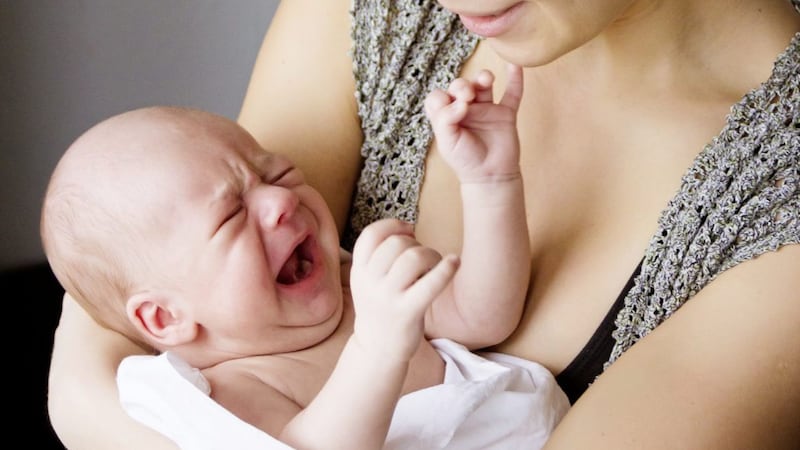NOTHING can really prepare you for the overwhelming experience of motherhood and its complex blend of joy, exhaustion, love and worry. While for many, words cannot express the happiness new life brings them, for many others having a new baby is a difficult trial of loneliness, sleeplessness and hopelessness.
Most mothers feel a bit down, tearful or anxious in what is commonly called 'the baby blues' the first week after giving birth. If symptoms persist longer than two weeks after birth or start later, it could be an indication of postnatal depression (PND).
NHS statistics suggest postnatal depression affects more than one in 10 women here within a year of giving birth. Symptoms can include difficulty bonding with your baby; a persistent low mood and loss of interest in the wider world; withdrawing from contact with other people; insomnia; problems concentrating and making decisions and frightening thoughts – for example, about hurting your baby.
Help and support are available, from psychological therapy to antidepressants and advice on self-help, which includes resting whenever you can, exercising regularly, eating a healthy diet and making time for yourself to do things you enjoy.
It can also affect a smaller number of fathers and it doesn't just affect first-time mums. However, like all mental illnesses, a stigma still surrounds PND and many women hide or deny how they are really feeling as they struggle with the demands of motherhood.
A recent survey on maternal mental health in the UK found that 43 per cent of new mums suffer extreme or disturbing thoughts, 64 per cent of mums never seek help for their symptoms and over a 33 per cent hide how they're feeling for fear of being deemed a 'bad parent'.
Armagh mum Natalia Dougan's experience of becoming a mum fourth time around was very different from her previous experiences. In the weeks following giving birth to her now two-year-old son Seth, Natalia found herself "becoming very robotic", in attending to her motherly duties. And as the weeks passed she found "everything an uphill battle".
"Even doing the cleaning was overwhelming. My memory and concentration was so poor, I was anxious all the time and found myself wanting to retreat into my own wee world, not leaving my home and even avoiding answering the telephone," she recalls.
Like many struggling mums, Natalia was in denial that she had an illness, telling her health visitor everything was fine.
"I thought people would think I was a bad mum," she admits. "I was pretending to smile through endless sadness. I remember going to visit Santa on Seth's first Christmas and although I was smiling outwardly, I was
feeling overwhelmed, anxious, agitated, zoned out, living as a robot and wearing a mask."
With her insomnia increasing and her behaviour deteriorating, her concerned mother and husband made Natalia a GP appointment, almost five months after Seth's birth, where she was prescribed an anti-depressant.
"I will never forget the day I went to the doctor – I cried the whole time. The doctor told me that although I didn't have a bandage or need to go for an operation, I was sick," she recalls.
Natalia admits "feeling like the worst mum in the world" and even contemplated ending her life.
"There were times I was in the car by myself and was hurting and feeling so guilty about how I was feeling. I had a great husband, home and beautiful children, yet I felt like driving into something would be best solution," she recalls, about the darkest moments of her illness.
As her condition worsened Natalia received daily treatment at Armagh Community Hospital, followed by counselling.
“I was the type of person who never liked to bother people, but the councillor made me realise I had to stop pushing everyone way."
She also learnt to appreciate the small things in life, such as opening her senses to the colours, sounds and smells around her during a walk, and enrolling in a sewing class.
Now back working part-time job as a classroom assistant, Natalia admits that she still struggles at times with her PND, particularly around certain triggers or times of the year.
"I keep working on the techniques my counsellor showed me and try not be as hard on myself,” she says.
She wants other mothers with postnatal depression to see they are not alone and that "it isn't wrong to ask for help" nor is it "naughty to have 'me' time".
She is grateful to the support she has found through the online community Have You Seen That Girl (HYSTG), run by Belfast mum Lindsay Robinson, but she feels strongly that Northern Ireland needs more local support networks to support women with post natal depression.
"I would love to see meet-ups for others going through the same thing. After my last day of counselling I felt so nervous and lonely about the future. It would be great to have support groups where if you were having bad days and negative thoughts you could be yourself and open up to those who understand what you're going through."
Ensuring the establishment of community-based peer support services is just one of 11 recommendations contained within the RQIA's Review of Perinatal Mental Health Services in Northern Ireland, which was published in January 2017.
In October last year a Public Health Agency regional group was establish to take forward the proposals. A Department of Health spokesperson said: "Individual task areas/sub-groups have been formed to address specific recommendations; however, a number of recommendations require ministerial approval and additional resources before any progress can be made.
"Progress is ongoing with recommendations which are not resource dependant such as practitioner training/development, identifying evidence based practice, care pathways and GP liasons."
Have You Seen That Girl blogger Lindsay Robinson, who is also employed one-day a week with the Maternal Mental Health Alliance (MMHA), knows at first hand the need for improved mental health support for women here.
She repeatedly sought help from health professionals following the birth of her son Reuben four years ago, only to have her concerns dismissed. It wasn't until two and a half years post-birth that she was given treatment, receiving cognitive behavioural therapy.
"There is more awareness of postnatal depression now, but in reality I hear from mothers every day who are struggling and have no idea who to turn to for help.
"The MMHA Everyone's Business report shows that 80 per cent of people in Northern Ireland do not have access to the specialist services they need. This means that every week that goes by, without the recommendations implemented, mums and their families are suffering and struggling without adequate resources available to help them recover. It's not good enough and we need to act now."
Lindsay, wife of east Belfast MP Gavin Robinson, does offer struggling parents a message of hope.
“I wanted to give up on life altogether. My message to struggling mums and dads is, they are not alone. This is an illness and it can be treated. There is hope and there is help."
:: For further resources on perinatal mental health visit Haveyouseenthatgirl.com





